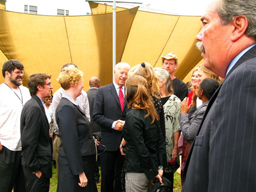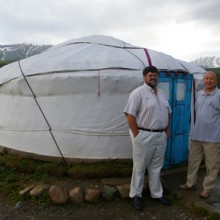By Matt Sinclair ’90
Early in his travels with the Peace Corps, Bill Bull ’85 was crossing an African river with another Peace Corp volunteer and some American visitors on a raft connected to the shore by cables. “We were halfway across when the cable snapped,” he recalls. As the raft slowly drifted, the visitors grew increasingly concerned. Bull and his Peace Corp buddy sat back, smoked cigarettes, and told their panicked guests, “Welcome to paradise.”
As he expected, they eventually hit shore. “The next thing will happen,” Bull says, reflecting a philosophy he says is common in Africa. “There are times to freak out and worry and panic, but most times such reactions aren’t necessary.”

Bill Bull '85 (far left) and other Peace Corps volunteers met Vice President Joe Biden during a visit to Kenya.
Bull, overseas safety and security specialist for Kenya, joined the Peace Corps after graduating from Lafayette with a degree in international affairs. He worked in Sierra Leone from 1985 to 1989, and later in Senegal, Mali, Gabon, and Madagascar in a variety of roles, from volunteer to director.
During his years in Madagascar, he and his family were evacuated twice in separate tours of duty. He also interacted with David Stifel, associate professor of economics, and students in the course Madagascar-Lafayette Initiative for Malagasy Education, a peer-mentoring program with high school students.
Bull’s strong leadership as country director in Madagascar led to the post having one of the Peace Corps’ highest extension rates and lowest early termination rates for volunteers. When his eight-year term ended, the Grand Chancellor and the U.S. Ambassador attended his farewell party. He was knighted as a Chevalier of the National Order of Merit in the Country of Madagascar.
That same year, he earned a global master of arts degree from Fletcher School of International Affairs, Tufts University.
Bull established the Peace Corps office in Liberia, where he met President Ellen Johnson Sirleaf, who he describes as “the real deal.” Soon after her inauguration in 2006, he went to her office for what he expected to be a quick meet-and-greet. “We had an hour-and-a-half discussion about how to get the best use of the Peace Corps,” he says. “She was switched on and tuned in. It was exciting to work with her.”
On March 4, 2006, Bull was among the first six recipients of the inaugural John F. Kennedy Service Award, given to recognize those who demonstrate exemplary service and leadership in fulfilling the Peace Corps’ mission.
After Madagascar, Bull began his current position. Based in Nairobi, hehas also traveled to Kyrgyzstan twice this year and covers Tanzania, Uganda, Rwanda, Ethiopia, Kenya, Mali, Niger, and Madagascar, many of which suffer from political unrest and long-term discontent.

Bill Bull '85 (left) and a Peace Corps driver outside a yurt in Kyrgyzstan.
Though he has had many wonderful experiences throughout much of Africa, Sierra Leone remains his first love. “That’s where it all caught fire for me,” he says.
He began to understand what it meant to be an embedded volunteer in another culture, not only for himself but for the people whose lives he was touching. He’s proud of having helped rice farmers increase production four-fold, but he says “it’s not just about maximizing [their crops or products], you need to help them understand their choices. What is the failsafe if something happens? It’s satisfying to help them meet goals, but it’s also fun to talk about choices and options.”
Of his own experience studying abroad in France as a student, he says, “living overseas helped me understand my own culture better and recognize the need to understand content and culture in context. Just because something is different doesn’t mean it’s bad.”
He adds that Lafayette prepared him well to write and think critically, which are vital skills when trying to convince funders and politicians about the need for services.
After all his experiences, Bull retains idealism and optimism as well as the sense that there is no single “solution” for the challenges that African countries face. Indeed, many of the people do not believe they live in countries. They understand themselves as members of ethnic groups and families.
“Cultural differences” is an oft-used phrase, but it tends to go undefined, perhaps because its nuances are not always positive. “There’s a naiveté in the American culture that anything can happen if you work hard enough, and that the future is something to embrace. That’s a wonderful philosophy,” he says. “But I’ve worked in places where there is no faith in tomorrow. That’s a huge difference, and it gets in the way time and time again. Why would you invest in the future if there is no assurance? The rains may not come….”
“But, I’ve seen phenomenal progress in Africa over the past three decades, and I have great hope – and there’s reason for great hope – that the major issues getting in the way are not unknown. Still, on some levels, Africa has yet to have its version of an Arab spring.”
In a sense, Bull has become a citizen of the world, as have his family members who often travel with him. He says his son and adoptive daughter hope to attend Lafayette, though he will likely continue to travel if and when that happens. “I am interested in learning more and going deeper in all the places I live,” he explains. “Theoretically, I’ve attained expert status and to me that means there’s a whole lot more I don’t know, but I’ve learned how to ask the right questions.”

